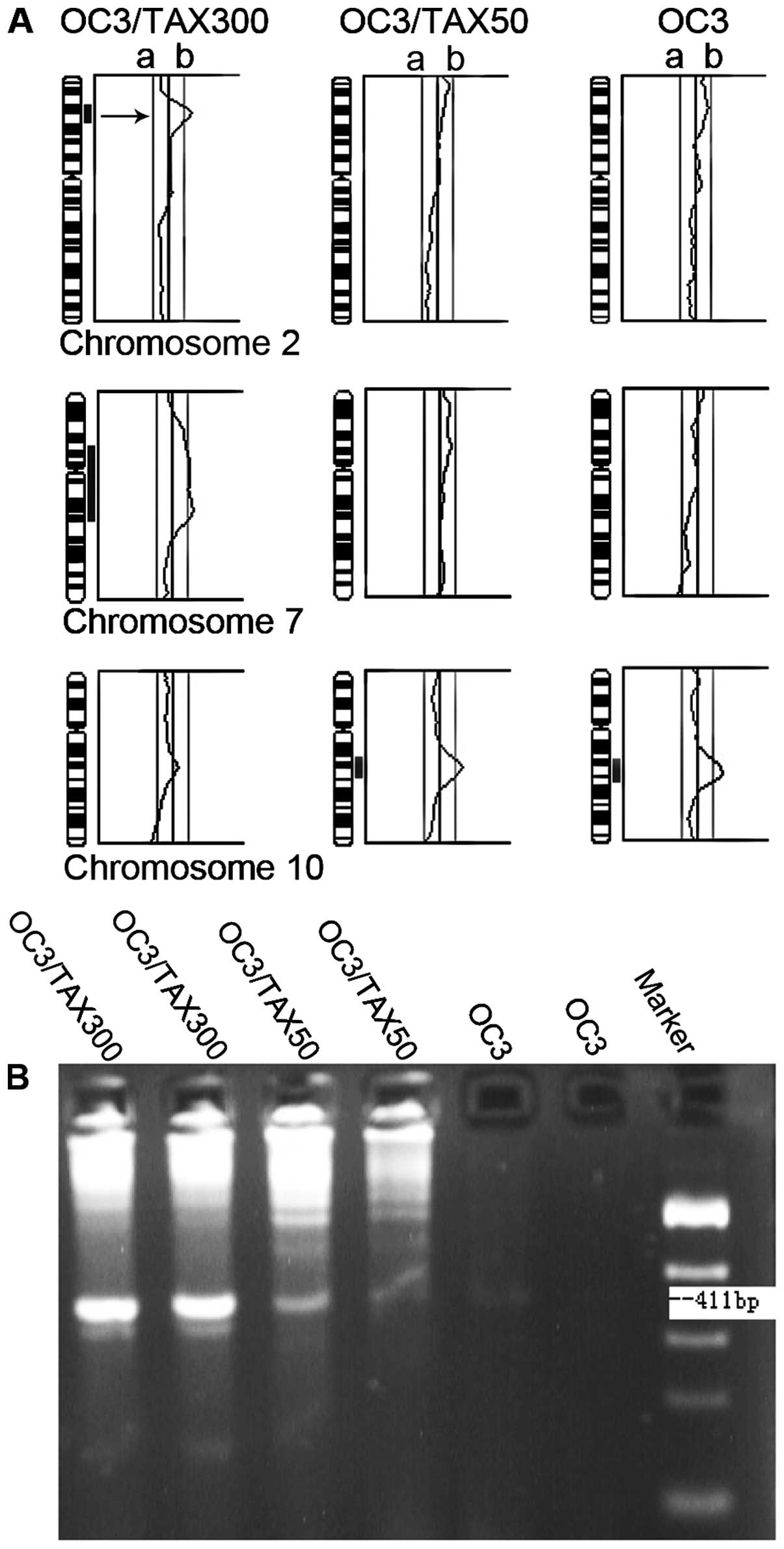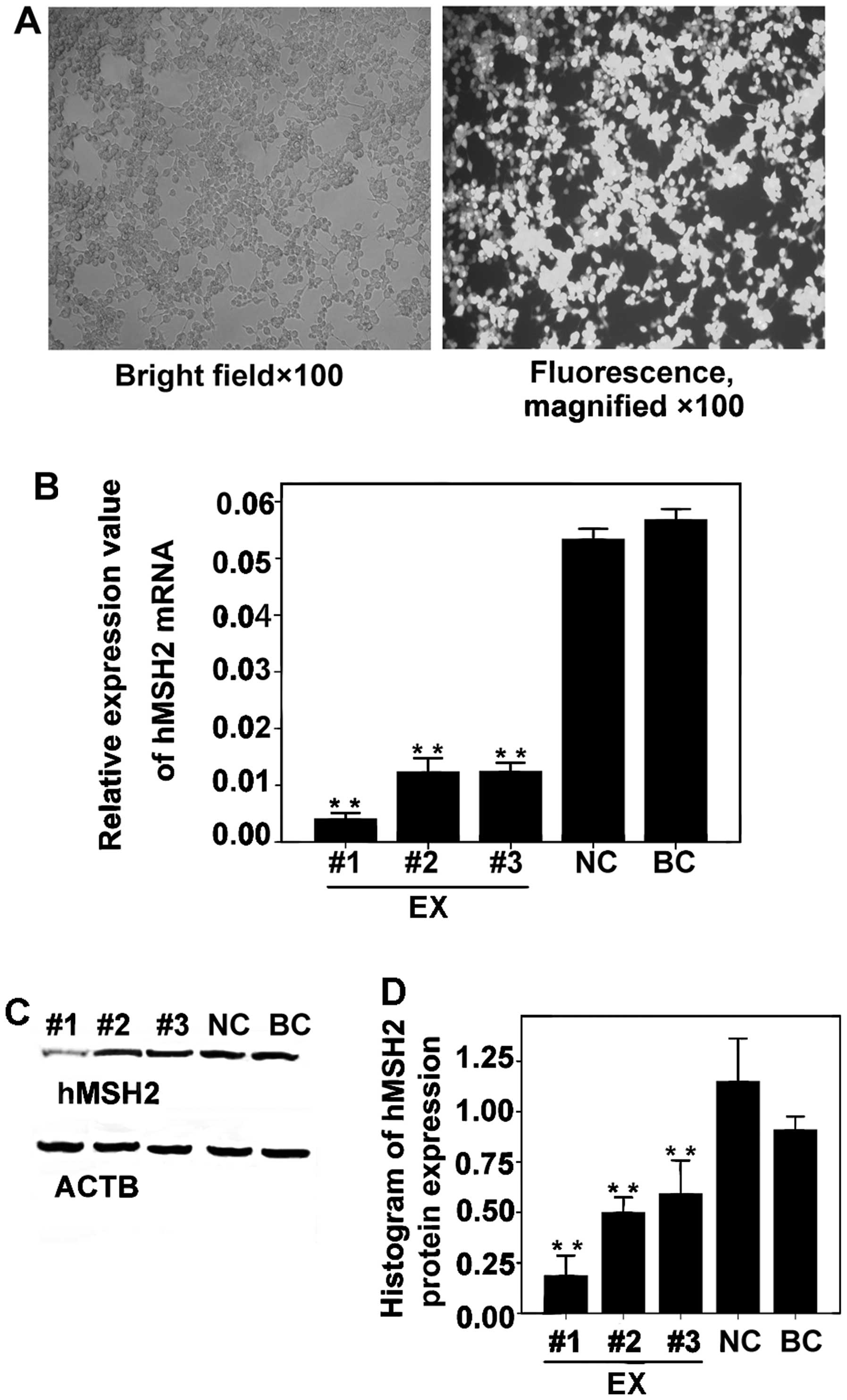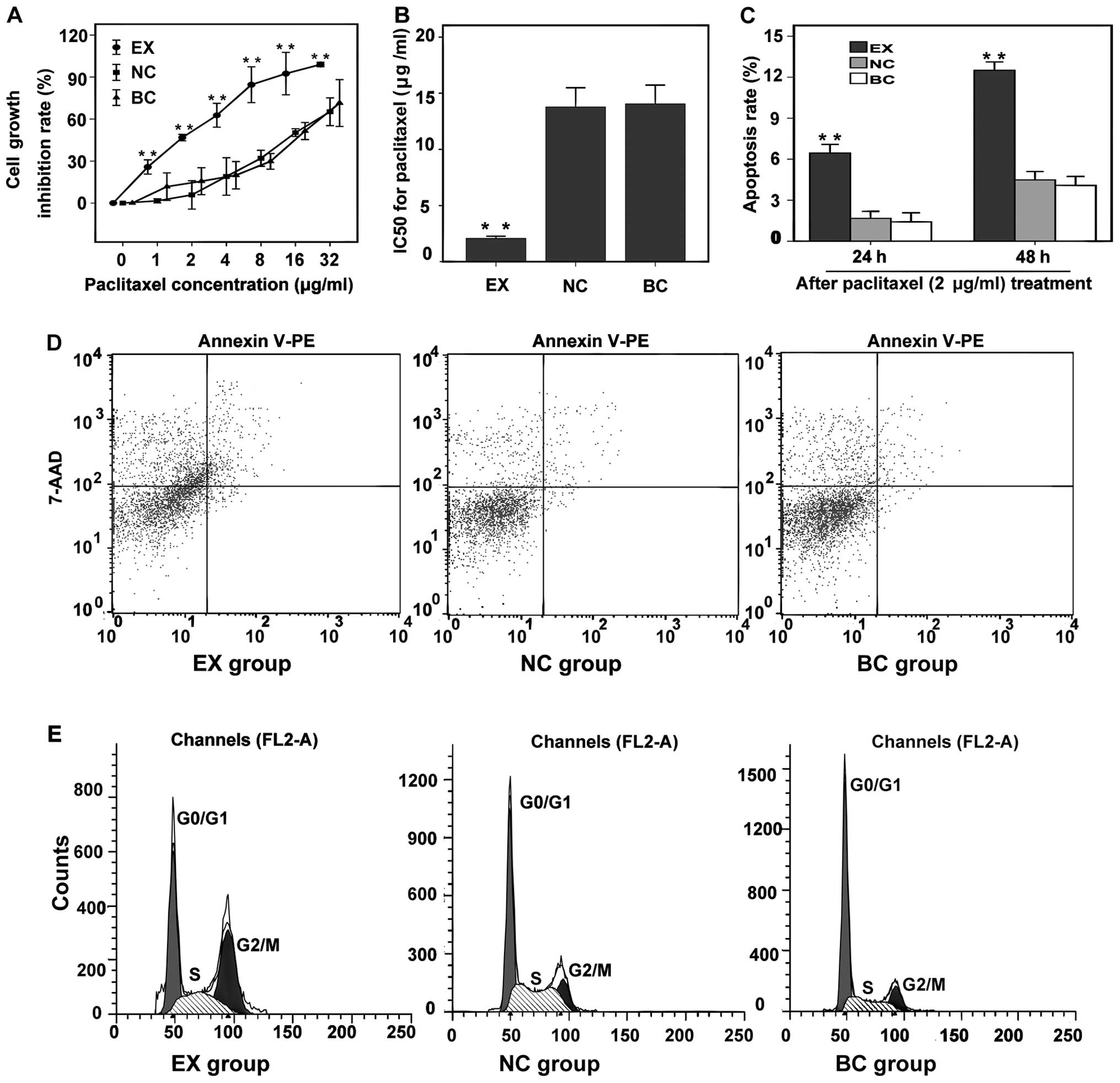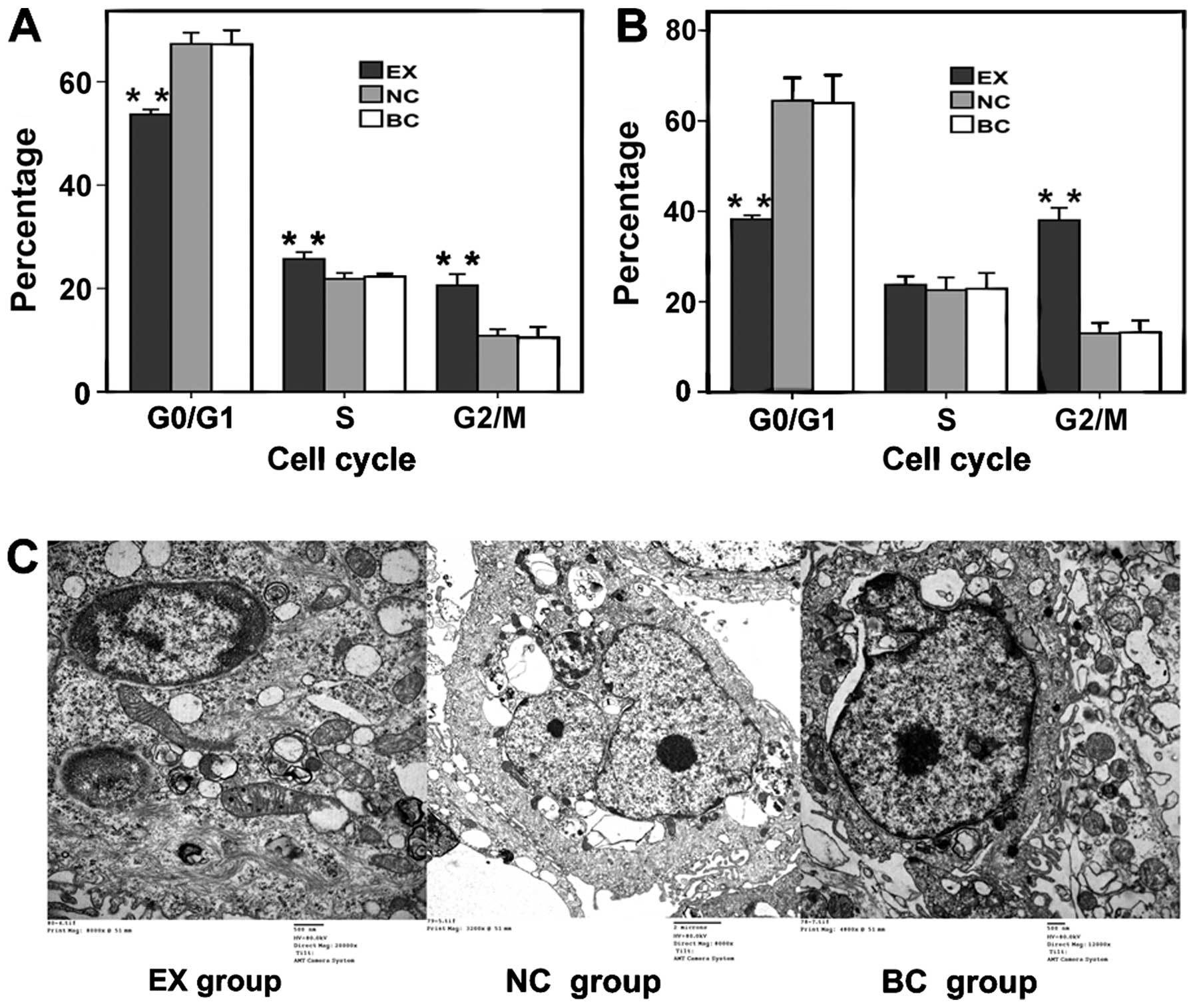|
1
|
Jemal A, Siegel R, Xu J and Ward E: Cancer
statistics, 2010. CA Cancer J Clin. 60:277–300. 2010. View Article : Google Scholar
|
|
2
|
Osterberg L, Levan K, Partheen K, Delle U,
Olsson B, Sundfeldt K, et al: Specific copy number alterations
associated with docetaxel/carboplatin response in ovarian
carcinomas. Anticancer Res. 30:4451–4458. 2010.PubMed/NCBI
|
|
3
|
Takano M, Kudo K, Goto T, Yamamoto K, Kita
T and Kikuchi Y: Analyses by comparative genomic hybridization of
genes relating with cisplatin-resistance in ovarian cancer. Hum
Cell. 14:267–271. 2001.PubMed/NCBI
|
|
4
|
Marcelis CL, van der Putten HW, Tops C,
Lutgens LC and Moog U: Chemotherapy resistant ovarian cancer in
carriers of an hMSH2 mutation? Fam Cancer. 1:107–109. 2001.
View Article : Google Scholar : PubMed/NCBI
|
|
5
|
Honda M, Okuno Y, Hengel SR, et al:
Mismatch repair protein hMSH2-hMSH6 recognizes mismatches and forms
sliding clamps within a D-loop recombination intermediate. Proc
Natl Acad Sci USA. 111:E316–E325. 2014. View Article : Google Scholar
|
|
6
|
Lynch HT, Lynch PM, Lanspa SJ, Snyder CL,
Lynch JF and Boland CR: Review of the Lynch syndrome: history,
molecular genetics, screening, differential diagnosis, and
medicolegal ramifications. Clin Genet. 76:1–18. 2009. View Article : Google Scholar : PubMed/NCBI
|
|
7
|
Masuda K, Banno K, Hirasawa A, et al:
Relationship of lower uterine segment cancer with Lynch syndrome: A
novel case with an hMLH1 germline mutation. Oncol Rep.
28:1537–1543. 2012.PubMed/NCBI
|
|
8
|
Yasin SL and Rainbow AJ: A combination of
MSH2 DNA mismatch repair deficiency and expression of the SV40
large T antigen results in cisplatin resistance of mouse embryonic
fibroblasts. Int J Oncol. 39:719–726. 2011.
|
|
9
|
Kheirelseid EA, Miller N, Chang KH, Curran
C, Henessey E, Sheehan M and Kerin MJ: Mismatch repair protein
expression in colorectal cancer. J Gastrointest Oncol. 4:397–408.
2013.PubMed/NCBI
|
|
10
|
Shah SN, Hile SE and Eckert KA: Defective
mismatch repair, microsatellite mutation bias, and variability in
clinical cancer phenotypes. Cancer Res. 70:431–435. 2010.
View Article : Google Scholar : PubMed/NCBI
|
|
11
|
Poulogiannis G, Frayling IM and Arends MJ:
DNA mismatch repair deficiency in sporadic colorectal cancer and
Lynch syndrome. Histopathology. 56:167–179. 2010. View Article : Google Scholar : PubMed/NCBI
|
|
12
|
Kamat N, Khidhir MA, Alashari MM and
Rannug U: Microsatellite instability and loss of heterozygosity
detected in middle-aged patients with sporadic colon cancer: A
retrospective study. Oncol Lett. 6:1413–1420. 2013.PubMed/NCBI
|
|
13
|
Chaney SG and Sancar A: DNA repair:
enzymatic mechanisms and relevance to drug response. J Natl Cancer
Inst. 88:1346–1360. 1996. View Article : Google Scholar : PubMed/NCBI
|
|
14
|
Ding J, Miao ZH, Meng LH and Geng MY:
Emerging cancer therapeutic opportunities target DNA-repair
systems. Trends Pharmacol Sci. 27:338–344. 2006. View Article : Google Scholar : PubMed/NCBI
|
|
15
|
Fox M and Roberts JJ: Drug resistance and
DNA repair. Cancer Metastasis Rev. 6:261–281. 1987. View Article : Google Scholar
|
|
16
|
Sánchez-Pérez I: DNA repair inhibitors in
cancer treatment. Clin Transl Oncol. 8:642–646. 2006.
|
|
17
|
Alzoubi K, Khabour O, Khader M, Mhaidat N
and Al-Azzam S: Evaluation of vitamin B12 effects on DNA damage
induced by paclitaxel. Drug Chem Toxicol. Nov 11–2013.(Epub ahead
of print). View Article : Google Scholar
|
|
18
|
Zhang J, Zhao J, Zhang W, et al:
Establishment of paclitaxel-resistant cell line and the underlying
mechanism on drug resistance. Int J Gynecol Cancer. 22:1450–1456.
2012.PubMed/NCBI
|
|
19
|
Zhang L, Liu P, Li H and Xue F: Effect of
histone deacetylase inhibitors on cell apoptosis and expression of
the tumor suppressor genes RUNX3 and ARHI in ovarian tumors. Mol
Med Rep. 7:1705–1709. 2013.PubMed/NCBI
|
|
20
|
Newell PD, Fricker AD, Roco CA,
Chandrangsu P and Merkel SM: A small-group activity introducing the
use and interpretation of BLAST. J Microbiol Biol Educ. 14:238–243.
2013. View Article : Google Scholar : PubMed/NCBI
|
|
21
|
Lin X, Yu Y, Zhao H, Zhang Y, Manela J and
Tonetti DA: Overexpression of PKCα is required to impart estradiol
inhibition and tamoxifen-resistance in a T47D human breast cancer
tumor model. Carcinogenesis. 27:1538–1546. 2006.
|
|
22
|
Mi J, Zhang X, Liu Y, Reddy SK, Rabbani
ZN, Sullenger BA and Clary BM: NF-kappaB inhibition by an
adenovirus expressed aptamer sensitizes TNF-alpha-induced
apoptosis. Biochem Biophys Res Commun. 359:475–480. 2007.
View Article : Google Scholar : PubMed/NCBI
|
|
23
|
Ciavattini A, Piccioni M, Tranquilli AL,
Filosa A, Pieramici T and Goteri G: Immunohistochemical expression
of DNA mismatch repair (MMR) system proteins (hMLH1, hMSH2) in
cervical preinvasive and invasive lesions. Pathol Res Pract.
201:21–25. 2005. View Article : Google Scholar : PubMed/NCBI
|
|
24
|
Materna V, Surowiak P, Markwitz E,
Spaczynski M, Drag-Zalesinska M, Zabel M and Lage H: Expression of
factors involved in regulation of DNA mismatch repair- and
apoptosis pathways in ovarian cancer patients. Oncol Rep.
17:505–516. 2007.PubMed/NCBI
|
|
25
|
Vageli DP, Zaravinos A, Daniil Z, et al:
hMSH2 and hMLH1 gene expression patterns differ between lung
adenocarcinoma and squamous cell carcinoma: correlation with
patient survival and response to adjuvant chemotherapy treatment.
Int J Biol Markers. 27:e400–e404. 2013. View Article : Google Scholar
|
|
26
|
Nadin SB, Vargas-Roig LM, Drago G, Ibarra
J and Ciocca DR: DNA damage and repair in peripheral blood
lymphocytes from healthy individuals and cancer patients: a pilot
study on the implications in the clinical response to chemotherapy.
Cancer Lett. 239:84–97. 2006. View Article : Google Scholar : PubMed/NCBI
|
|
27
|
Leach FS, Hsieh JT, Molberg K, Saboorian
MH, McConnell JD and Sagalowsky AI: Expression of the human
mismatch repair gene hMSH2: a potential marker for
urothelial malignancy. Cancer. 88:2333–2341. 2000. View Article : Google Scholar : PubMed/NCBI
|
|
28
|
Prtilo A, Leach FS, Markwalder R, et al:
Tissue microarray analysis of hMSH2 expression predicts
outcome in men with prostate cancer. J Urol. 174:1814–1818.
2005.PubMed/NCBI
|
|
29
|
Li M, Zhang Q, Liu L, Lu W, Wei H, Li RW
and Lu S: Expression of the mismatch repair gene hMLH1 is enhanced
in non-small cell lung cancer with EGFR mutations. PLoS One.
8:e785002013. View Article : Google Scholar : PubMed/NCBI
|
|
30
|
Aebi S, Fink D, Gordon R, Kim HK, Zheng H,
Fink JL and Howell SB: Resistance to cytotoxic drugs in DNA
mismatch repair-deficient cells. Clin Cancer Res. 3:1763–1777.
1997.PubMed/NCBI
|
|
31
|
Wiewrodt D, Nagel G, Dreimüller N,
Hundsberger T, Perneczky A and Kaina B: MGMT in primary and
recurrent human glioblastomas after radiation and chemotherapy and
comparison with p53 status and clinical outcome. Int J Cancer.
122:1391–1399. 2008. View Article : Google Scholar : PubMed/NCBI
|
|
32
|
Cadet J, Douki T, Gasparutto D and Ravanat
JL: Oxidative damage to DNA: formation, measurement and biochemical
features. Mutat Res. 531:5–23. 2003. View Article : Google Scholar : PubMed/NCBI
|
|
33
|
Gurubhagavatula S, Liu G, Park S, et al:
XPD and XRCC1 genetic polymorphisms are prognostic factors in
advanced non-small-cell lung cancer patients treated with platinum
chemotherapy. J Clin Oncol. 22:2594–2601. 2004. View Article : Google Scholar
|
|
34
|
Chen HY, Shao CJ, Chen FR, Kwan AL and
Chen ZP: Role of ERCC1 promoter hypermethylation in drug resistance
to cisplatin in human gliomas. Int J Cancer. 126:1944–1954.
2010.PubMed/NCBI
|
|
35
|
Steffensen KD, Smoter M, Waldstrøm M, et
al: Resistance to first line platinum paclitaxel chemotherapy in
serous epithelial ovarian cancer: The prediction value of ERCC1 and
Tau expression. Int J Oncol. 44:1736–1744. 2014.PubMed/NCBI
|
|
36
|
Li QQ, Lee RX, Liang H, Wang G, Li JM,
Zhong Y and Reed E: β-Elemene enhances susceptibility to cisplatin
in resistant ovarian carcinoma cells via downregulation of ERCC-1
and XIAP and inactivation of JNK. Int J Oncol. 43:721–728.
2013.
|
|
37
|
Ko JC, Ciou SC, Cheng CM, et al:
Involvement of Rad51 in cytotoxicity induced by epidermal growth
factor receptor inhibitor (gefitinib, Iressa®) and
chemotherapeutic agents in human lung cancer cells. Carcinogenesis.
29:1448–1458. 2008. View Article : Google Scholar : PubMed/NCBI
|
|
38
|
Zhu Y, Hu J, Hu Y and Liu W: Targeting DNA
repair pathways: a novel approach to reduce cancer therapeutic
resistance. Cancer Treat Rev. 35:590–596. 2009. View Article : Google Scholar : PubMed/NCBI
|
|
39
|
Curtin N: Therapeutic potential of drugs
to modulate DNA repair in cancer. Expert Opin Ther Targets.
11:783–799. 2007. View Article : Google Scholar : PubMed/NCBI
|
|
40
|
Mohammed MZ, Vyjayanti VN, Laughton CA, et
al: Development and evaluation of human AP endonuclease inhibitors
in melanoma and glioma cell lines. Br J Cancer. 104:653–663. 2011.
View Article : Google Scholar : PubMed/NCBI
|
|
41
|
Rodon J, Iniesta MD and Papadopoulos K:
Development of PARP inhibitors in oncology. Expert Opin Investig
Drugs. 18:31–43. 2009. View Article : Google Scholar
|
|
42
|
Lenglet G and David-Cordonnier MH:
DNA-destabilizing agents as an alternative approach for targeting
DNA: mechanisms of action and cellular consequences. J Nucleic
Acids. 2010:2909352010. View Article : Google Scholar : PubMed/NCBI
|


















